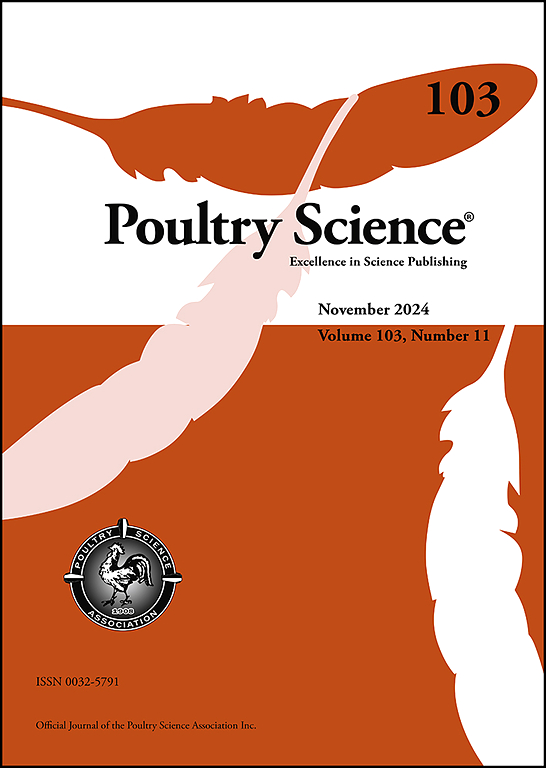饲粮抗性淀粉通过恢复肉鸭肠道微生物稳态和维持肠道屏障功能来预防抗生素后肠道损伤
IF 3.8
1区 农林科学
Q1 AGRICULTURE, DAIRY & ANIMAL SCIENCE
引用次数: 0
摘要
抗性淀粉(RS)被认为是一种通过调节肠道微生物群来支持肠道和宿主整体健康的营养策略。为了直接评估RS对肉鸭肠道菌群的影响及其在改善肠道屏障功能中的作用,本研究首先建立了抗生素诱导的肉鸭微生物生态失调模型,该模型以抗生素暴露后肠道微生物多样性降低、肠道功能障碍和炎症爆发为特征。随后,除对照组外,将连续饲喂抗生素7 d的鸭分为2组,分别饲喂基础饲粮和由12%马铃薯淀粉制成的RS饲粮,直至21 d。结果表明,饲粮中添加RS扭转了抗生素引起的微生物多样性减少,恢复了厚壁菌门与拟杆菌门的比例。此外,RS包埋丰富了有益菌属,包括coprobter、Odoribacter和Faecalibacterium (LDA评分>;3).抗生素干预后导致绒毛密度和肌肉厚度降低,并伴有显著下调(P <;0.05),闭塞带-1和粘蛋白-2表达水平升高,血清促炎细胞因子水平升高(P <;0.05)。饲粮中添加RS显著提高了(P <;0.05)胰高血糖素样肽受体和抗凋亡因子Bcl-2的表达,同时抑制caspase转录。这导致回肠的绒毛高度和肌肉厚度增加(P <;0.05)。此外,RS干预显著降低(P <;0.05)回肠和血清中促炎细胞因子水平,特别是白细胞介素-1β和肿瘤坏死因子-α。这些影响可能与盲肠微生物群的改变有关,包括巴尼斯氏菌、反刍芽胞杆菌、巨单胞菌、粪菌、克氏Adlercreutzia、Coprobacter和Collinsella的丰度增加。综上所述,饲粮中添加RS可通过促进肠细胞增殖和减少细胞凋亡,减轻抗生素诱导的盲肠微生物生态失调,恢复肠道结构。因此,补充RS有助于缓解抗生素治疗后肉鸭的全身炎症。本文章由计算机程序翻译,如有差异,请以英文原文为准。
Dietary resistant starch protects against post-antibiotic intestinal damage by restoring microbial homeostasis and preserving intestinal barrier function in meat duck
Resistant starch (RS) is recognized as a nutritional strategy that supports gut and overall host health by modulating gut microbiota. To directly assess the effects of RS on gut microbiota and its role in improving intestinal barrier function in meat ducks, this study first established an antibiotic-induced microbial dysbiosis model, which was characterized by reduced gut microbial diversity, intestinal dysfunction, and an inflammatory outburst following antibiotic exposure. Whereafter, in addition to the control group, ducks treated with antibiotics for 7 consecutive days were further allocated to two groups and fed the basal diet and RS diet that derived from 12 % raw potato starch until 21 d. The results demonstrated that dietary RS supplementation reversed the antibiotic-induced reduction in microbial diversity and restored the Firmicutes-to-Bacteroidetes ratio. Additionally, RS inclusion enriched beneficial bacterial genera, including Coprobacter, Odoribacter, and Faecalibacterium (LDA score > 3). Post-antibiotic intervention led to a reduction in villus density and muscular thickness, accompanied by a significant downregulation (P < 0.05) of zonula occludens-1 and mucin-2 expression, along with increased serum pro-inflammatory cytokine levels (P < 0.05). Notably, dietary RS supplementation significantly enhanced (P < 0.05) the expression of glucagon-like peptide receptor and the anti-apoptotic factor Bcl-2, while suppressing caspase transcription. This resulted in increased villus height and muscular thickness in the ileum (P < 0.05). Furthermore, RS intervention remarkably reduced (P < 0.05) pro-inflammatory cytokine levels, particularly interleukin-1β and tumor necrosis factor-α, in both the ileum and serum. These effects were likely linked to alterations in cecal microbiota, including increased abundances of Barnesiella, Ruminiclostridium 9, Megamonas, Faecalitalea, Adlercreutzia, Coprobacter and Collinsella. In conclusion, dietary RS supplementation mitigated antibiotic-induced cecal microbial dysbiosis and restored intestinal structure by promoting enterocyte proliferation and reducing apoptosis. Consequently, RS supplementation helped alleviate systemic inflammation in meat ducks following antibiotic treatment.
求助全文
通过发布文献求助,成功后即可免费获取论文全文。
去求助
来源期刊

Poultry Science
农林科学-奶制品与动物科学
CiteScore
7.60
自引率
15.90%
发文量
0
审稿时长
94 days
期刊介绍:
First self-published in 1921, Poultry Science is an internationally renowned monthly journal, known as the authoritative source for a broad range of poultry information and high-caliber research. The journal plays a pivotal role in the dissemination of preeminent poultry-related knowledge across all disciplines. As of January 2020, Poultry Science will become an Open Access journal with no subscription charges, meaning authors who publish here can make their research immediately, permanently, and freely accessible worldwide while retaining copyright to their work. Papers submitted for publication after October 1, 2019 will be published as Open Access papers.
An international journal, Poultry Science publishes original papers, research notes, symposium papers, and reviews of basic science as applied to poultry. This authoritative source of poultry information is consistently ranked by ISI Impact Factor as one of the top 10 agriculture, dairy and animal science journals to deliver high-caliber research. Currently it is the highest-ranked (by Impact Factor and Eigenfactor) journal dedicated to publishing poultry research. Subject areas include breeding, genetics, education, production, management, environment, health, behavior, welfare, immunology, molecular biology, metabolism, nutrition, physiology, reproduction, processing, and products.
 求助内容:
求助内容: 应助结果提醒方式:
应助结果提醒方式:


